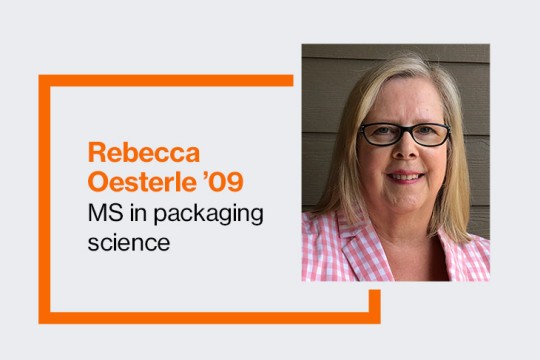Packaging Science Master of Science Degree

Packaging Science
Master of Science Degree
- RIT /
- Rochester Institute of Technology /
- Academics /
- Packaging Science MS
The master’s in packaging science enables you to create visually stunning, environmentally friendly packaging that’s functional and durable enough to be aesthetically pleasing and sustainable for the environmental while also withstanding the stresses of distribution and transportation.
Overview for Packaging Science MS
Why Pursue a Masters in Packaging Science at RIT?
STEM-OPT Visa Eligible: The STEM Optional Practical Training (OPT) program allows full-time, on-campus international students on an F-1 student visa to stay and work in the U.S. for up to three years after graduation.
Combination of Theoretical and Hands-on Learning Experiences: Gain comprehensive knowledge related to packaging design, package testing, product marketing, project management, and quality control.
Future-Focused Curriculum: Take dynamic courses in packaging dynamics, packaging and the environment, product packaging for end use, and distribution systems.
Flexible Options to Complete Your Degree: Choose between a thesis, capstone project, or comprehensive exam to earn your master's in packaging science.
Designed for packaging professionals to become experts in the packaging development process, the master's in packaging science focuses on selecting raw materials, developing environmentally friendly packaging solutions, and creating functional packaging that withstands environmental, chemical, and physical stresses during distribution and transportation. The program will also help you to keep these functional aspects in mind as you develop attractive packaging designs that are aesthetically pleasing as they pique consumer interest. This master's in packaging science combines theoretical and hands-on learning experiences that enable you to gain comprehensive knowledge related to packaging design, package testing, product marketing, project management, and quality control.
What is Packaging Science?
Packaging science is a dynamic field that integrates engineering, design, and business to develop and design product packaging for a range of consumer goods. Packaging engineers and packaging designers focus on understanding the packaging needs of a product and what it must accomplish. These needs can range from maintaining food freshness and safety, keeping products safe from damage during transportation, appealing to consumers at the point of purchase, communicating product information, sustaining transportation efficiency, complying with sustainable practices for post-use recycling and reuse, and more. It’s the role of packaging engineers and packaging designers to responsibility weigh these factors into the conceptualization, design, and development of product packaging.
Packaging Science Courses
The packaging science master’s consists of core courses, elective courses, and either a comprehensive exam, capstone project, or thesis. The total number of elective courses depends on your choice of the exam, project, or thesis option. Faculty advisors assist in selecting an option that best meets your career aspirations.
Core courses for the master's of packaging science cover topics such as packaging dynamics, packaging and the environment, product packaging for end use, and distribution systems, including supply chain management. Elective courses are approved by your advisor and must meet degree requirements. In certain circumstances, with pre-approval by the graduate advisor and where individual need indicates appropriateness, a limited number of upper-level undergraduate courses may be used to fulfill elective credit. With advisor permission, you may include independent study as part of your elective credits. However, independent study may not be used toward the required packaging core coursework. Courses selected for elective credit may be combined to create special areas of focus with the program chair's approval.
Green Belt – Lean Six Sigma
Students may elect to pursue a Green Belt certificate in Lean Six Sigma with the completion of the thesis or capstone project. Certification requires students to complete the Lean Six Sigma Yellow Belt Certification training program as one of their electives. Upon completion, students must implement the fundamentals of Lean Six Sigma within their thesis or capstone project.
-
Join us for Fall 2025
Many programs accept applications on a rolling, space-available basis.
-
30% Tuition Scholarship for NY Residents and Graduates
Now is the perfect time to earn your Master’s degree. If you’re a New York state resident with a bachelor’s degree or have/will graduate from a college or university in New York state, you are eligible to receive a 30% tuition scholarship.
-
Next Steps to Enroll
Accept your offer of admission and take the next steps toward becoming an RIT Tiger.
Careers and Cooperative Education
Typical Job Titles
| Associate Specialist - Packaging Operations | Packaging Engineer | Packaging Designer |
| Package Developer | Product Engineer | Packaging Scientist |
| Package Engineering Technician | Packaging Sales | Structural Designer |
| Packaging and Display Sales | Packaging Development Engineer | Packaging Project Management Engineer |
| Display Services Specialist |
Cooperative Education
What makes an RIT education exceptional? It’s the ability to complete relevant, hands-on career experience. At the graduate level, and paired with an advanced degree, cooperative education and internships give you the unparalleled credentials that truly set you apart. Learn more about graduate co-op and how it provides you with the career experience employers look for in their next top hires.
Full-time students may choose to complete cooperative education. After completing two semesters of study (a minimum of 18 credit hours), students may request approval to complete up to one year of cooperative education related to packaging.
Featured Work and Profiles
-
Packaging Science Student places Top 3 in National Competition
Spectrum News highlights the team behind the packaging for Grovey Garlic, a sustainable hexagon-shaped structure created without glue.
Read More about Packaging Science Student places Top 3 in National Competition -
Environmental responsibility in the food sector
Daniel Johnson WXXI talks to professor Daniel Johnson in the Department of Packaging and Graphic Media Science about climate-friendly food sector practices.
Read More about Environmental responsibility in the food sector -
RIT student team named finalists in national packaging design challenge
Students’ packaging design is a top three finalist in the annual Paperboard Packaging Student Design Challenge. The team includes Malena Juif, a fourth-year packaging science student. “You...
Read More about RIT student team named finalists in national packaging design challenge -
Packaging Pioneer Inducted into Hall of Fame for 40-Year Career
Rebecca Oesterle Rebecca Oesterle, RIT alumna and former industry leader at Energizer and Just Born Quality Confections, was honored with a spot in the Packaging and Processing Hall of Fame for her groundbreaking...
Read More about Packaging Pioneer Inducted into Hall of Fame for 40-Year Career -
Excellence in Design
RIT student team Four of eight student design teams from RIT that were entered in the national Paperboard Packaging Alliance competition were awarded top placements for excellence in design. The Misfit Burst took...
Read More about Excellence in Design -
Professor Guides Students in Cross-Disciplinary Packaging Innovation
Karen Proctor Professor Karen Proctor’s interdisciplinary courses in packaging science, graphic design, and industrial design at RIT offer students a unique hands-on experience, working together on real-world...
Read More about Professor Guides Students in Cross-Disciplinary Packaging Innovation
Curriculum for 2024-2025 for Packaging Science MS
Current Students: See Curriculum Requirements
Packaging Science (thesis option), MS degree, typical course sequence
| Course | Sem. Cr. Hrs. | |
|---|---|---|
| First Year | ||
| GRCS-701 | Research Methods |
3 |
Understanding research and academic writing are foundational skills for all graduate students regardless of degree culmination. This is a graduate-level survey course on research design/methods and analysis, with the goal of all students becoming better consumers of research, and preparing those who choose an empirical research degree culmination and future doctoral pursuits. The course provides a broad overview of the process and practices of research in applied contexts. Content includes principles and techniques of research design, sampling, data collection, and analysis including the nature of evidence, types of research, defining research questions, sampling techniques, data collection, data analysis, issues concerning human subjects and research ethics, and challenges associated with conducting research in real-world contexts. Research strategies using library sources, including academic databases and citation management, are emphasized; as are academic writing skills, including adherence to academic style. The analysis component of the course provides an understanding of statistical methodology used to collect and interpret data found in research as well as how to read and interpret data collection instruments. Lecture 3 (Fall, Spring). | ||
| PACK-730 | Packaging and the Environment |
3 |
Consideration of packaging in a social context. Factors that enhance secondary use, recycling, recovery of resources, and proper disposal are discussed. Package design in relation to solid waste disposal and materials and energy shortages are considered. Other topics of interest are discussed. Primarily a discussion class for graduate students. Open to graduate non-majors. Lecture 3 (Spring). | ||
| PACK-742 | Distribution Systems |
3 |
The course develops knowledges and application skills of the distribution packaging. Topics covered are packaging used in distribution systems, integrated packaging supply chain, modeling and analysis of the distribution systems, and score card in packaging supply chain. Emphasises are given to estimate and predict the packaging protection and to optimize the packaging distribution using various tools. The lab focuses on development and evaluation of a distribution packaging. The projects are designed to assess the packaging performance in distribution systems. (This course is restricted to students in the PACK-MS program.) Lecture 3 (Spring). | ||
| PACK-763 | Packaging for End Use |
3 |
An intensive study of package design requirements specific to use of a product at specified end points. Individual design and development of a package system and its specifications, appropriate to the needs of the product and the consumer/end user and meets the demands of the supply chain. (Prerequisites: PACK-451 or equivalent course or graduate student standing in the PACK-MS program.) Lecture 3 (Spring). | ||
| PACK-783 | Advanced Packaging Dynamics |
3 |
The study of instrumentation systems for analysis, evaluation and application of shock and vibration test methods to develop protective package designs and effective product/package interaction. A research paper is required. (This course is restricted to students in the PACK-MS program.) Lecture 3, Recitation 1 (Spring). | ||
| PACK-790 | Research Thesis |
6 |
A thesis is based on experimental evidence obtained by the candidate in an appropriate topic demonstrating the extension of theory into practice. A written proposal which is defended and authorized by the faculty advisor/committee followed by a formal written thesis and oral presentation of findings are required. Typically the candidate will have completed research methods, data analysis and graduate writing strategies prior to enrolling in this course and will start the thesis process as soon as they have completed these courses to allow them to finish the thesis when they have finished their coursework. The candidate must obtain the approval of their graduate adviser who will guide the thesis before registering for this course. (Enrollment in this course requires permission from the department offering the course.) Thesis (Fall, Spring, Summer). | ||
Packaging Electives |
9 | |
| Total Semester Credit Hours | 30 |
|
Packaging Science (capstone project option), MS degree, typical course sequence
| Course | Sem. Cr. Hrs. | |
|---|---|---|
| First Year | ||
| GRCS-701 | Research Methods |
3 |
Understanding research and academic writing are foundational skills for all graduate students regardless of degree culmination. This is a graduate-level survey course on research design/methods and analysis, with the goal of all students becoming better consumers of research, and preparing those who choose an empirical research degree culmination and future doctoral pursuits. The course provides a broad overview of the process and practices of research in applied contexts. Content includes principles and techniques of research design, sampling, data collection, and analysis including the nature of evidence, types of research, defining research questions, sampling techniques, data collection, data analysis, issues concerning human subjects and research ethics, and challenges associated with conducting research in real-world contexts. Research strategies using library sources, including academic databases and citation management, are emphasized; as are academic writing skills, including adherence to academic style. The analysis component of the course provides an understanding of statistical methodology used to collect and interpret data found in research as well as how to read and interpret data collection instruments. Lecture 3 (Fall, Spring). | ||
| PACK-742 | Distribution Systems |
3 |
The course develops knowledges and application skills of the distribution packaging. Topics covered are packaging used in distribution systems, integrated packaging supply chain, modeling and analysis of the distribution systems, and score card in packaging supply chain. Emphasises are given to estimate and predict the packaging protection and to optimize the packaging distribution using various tools. The lab focuses on development and evaluation of a distribution packaging. The projects are designed to assess the packaging performance in distribution systems. (This course is restricted to students in the PACK-MS program.) Lecture 3 (Spring). | ||
| PACK-730 | Packaging and the Environment |
3 |
Consideration of packaging in a social context. Factors that enhance secondary use, recycling, recovery of resources, and proper disposal are discussed. Package design in relation to solid waste disposal and materials and energy shortages are considered. Other topics of interest are discussed. Primarily a discussion class for graduate students. Open to graduate non-majors. Lecture 3 (Spring). | ||
| PACK-763 | Packaging for End Use |
3 |
An intensive study of package design requirements specific to use of a product at specified end points. Individual design and development of a package system and its specifications, appropriate to the needs of the product and the consumer/end user and meets the demands of the supply chain. (Prerequisites: PACK-451 or equivalent course or graduate student standing in the PACK-MS program.) Lecture 3 (Spring). | ||
| PACK-783 | Advanced Packaging Dynamics |
3 |
The study of instrumentation systems for analysis, evaluation and application of shock and vibration test methods to develop protective package designs and effective product/package interaction. A research paper is required. (This course is restricted to students in the PACK-MS program.) Lecture 3, Recitation 1 (Spring). | ||
| PACK-797 | Graduate Project |
3 |
The purpose of this course is to provide students the opportunity to conduct research, develop a plan and evaluation components and submit the project as a demonstration of final proficiency in the program. The topic selected by the student will be guided by the faculty teaching the class and it will require the student to coalesce and incorporate into the final project a culmination of all their course work in the program to date. (Enrollment in this course requires permission from the department offering the course.) Project (Spring). | ||
Packaging Electives |
12 | |
| Total Semester Credit Hours | 30 |
|
Packaging Science (comprehensive exam option), MS degree, typical course sequence
| Course | Sem. Cr. Hrs. | |
|---|---|---|
| First Year | ||
| GRCS-701 | Research Methods |
3 |
Understanding research and academic writing are foundational skills for all graduate students regardless of degree culmination. This is a graduate-level survey course on research design/methods and analysis, with the goal of all students becoming better consumers of research, and preparing those who choose an empirical research degree culmination and future doctoral pursuits. The course provides a broad overview of the process and practices of research in applied contexts. Content includes principles and techniques of research design, sampling, data collection, and analysis including the nature of evidence, types of research, defining research questions, sampling techniques, data collection, data analysis, issues concerning human subjects and research ethics, and challenges associated with conducting research in real-world contexts. Research strategies using library sources, including academic databases and citation management, are emphasized; as are academic writing skills, including adherence to academic style. The analysis component of the course provides an understanding of statistical methodology used to collect and interpret data found in research as well as how to read and interpret data collection instruments. Lecture 3 (Fall, Spring). | ||
| PACK-742 | Distribution Systems |
3 |
The course develops knowledges and application skills of the distribution packaging. Topics covered are packaging used in distribution systems, integrated packaging supply chain, modeling and analysis of the distribution systems, and score card in packaging supply chain. Emphasises are given to estimate and predict the packaging protection and to optimize the packaging distribution using various tools. The lab focuses on development and evaluation of a distribution packaging. The projects are designed to assess the packaging performance in distribution systems. (This course is restricted to students in the PACK-MS program.) Lecture 3 (Spring). | ||
| PACK-730 | Packaging and the Environment |
3 |
Consideration of packaging in a social context. Factors that enhance secondary use, recycling, recovery of resources, and proper disposal are discussed. Package design in relation to solid waste disposal and materials and energy shortages are considered. Other topics of interest are discussed. Primarily a discussion class for graduate students. Open to graduate non-majors. Lecture 3 (Spring). | ||
| PACK-763 | Packaging for End Use |
3 |
An intensive study of package design requirements specific to use of a product at specified end points. Individual design and development of a package system and its specifications, appropriate to the needs of the product and the consumer/end user and meets the demands of the supply chain. (Prerequisites: PACK-451 or equivalent course or graduate student standing in the PACK-MS program.) Lecture 3 (Spring). | ||
| PACK-783 | Advanced Packaging Dynamics |
3 |
The study of instrumentation systems for analysis, evaluation and application of shock and vibration test methods to develop protective package designs and effective product/package interaction. A research paper is required. (This course is restricted to students in the PACK-MS program.) Lecture 3, Recitation 1 (Spring). | ||
| PACK-795 | Comprehensive Examination |
0 |
A written comprehensive exam is one of the non-thesis methodologies for completion of the MS degree. Students will demonstrate a fundamental knowledge of the theories and foundation principles. This course will include a review of the main concepts of each of the core subjects and at the conclusion of the course the student will take a written examination and must receive a passing grade of at least 80 percent to be successful. Students will have one additional opportunity to pass this examination if their initial attempt results in a failing grade. (Faculty adviser approval required). (Enrollment in this course requires permission from the department offering the course.) Comp Exam 3 (Fall, Summer). | ||
Packaging Electives |
15 | |
| Total Semester Credit Hours | 30 |
|
Students are also interested in
Admissions and Financial Aid
This program is available on-campus only.
| Offered | Admit Term(s) | Application Deadline | STEM Designated |
|---|---|---|---|
| Full‑time | Fall | Rolling | Yes |
Full-time study is 9+ semester credit hours. International students requiring a visa to study at the RIT Rochester campus must study full‑time.
Application Details
To be considered for admission to the Packaging Science MS program, candidates must fulfill the following requirements:
- Complete an online graduate application.
- Submit copies of official transcript(s) (in English) of all previously completed undergraduate and graduate course work, including any transfer credit earned.
- Hold a baccalaureate degree (or US equivalent) from an accredited university or college. A minimum cumulative GPA of 3.0 (or equivalent) is recommended.
- Satisfy prerequisite requirements and/or complete bridge courses prior to starting program coursework.
- Submit a current resume or curriculum vitae.
- Submit a personal statement of educational objectives.
- Submit two letters of recommendation.
- Entrance exam requirements: None
- Submit English language test scores (TOEFL, IELTS, PTE Academic), if required. Details are below.
English Language Test Scores
International applicants whose native language is not English must submit one of the following official English language test scores. Some international applicants may be considered for an English test requirement waiver.
| TOEFL | IELTS | PTE Academic |
|---|---|---|
| 79 | 6.5 | 56 |
International students below the minimum requirement may be considered for conditional admission. Deaf and hard-of-hearing test takers with significant hearing loss do not need to take the listening and speaking sections for the TOEFL and IELTS. Each program requires balanced sub-scores when determining an applicant’s need for additional English language courses.
How to Apply Start or Manage Your Application
Cost and Financial Aid
An RIT graduate degree is an investment with lifelong returns. Graduate tuition varies by degree, the number of credits taken per semester, and delivery method. View the general cost of attendance or estimate the cost of your graduate degree.
A combination of sources can help fund your graduate degree. Learn how to fund your degree
Additional Information
Prerequisites
Applicants must have completed at least one semester of physics (mechanics focus), one semester of calculus, one year of chemistry (including organic chemistry), statistics, and basic computer literacy.
Bridge Courses
Applicants who do not have an equivalent bachelor’s degree in packaging science will be evaluated and the appropriate undergraduate bridge courses will be prescribed. These courses may not be used for credit toward the MS degree.
Related News
-
November 6, 2024

Students recognized for excellence in graphics and research at national flexographic printing challenge
Undergraduate students at Rochester Institute of Technology took top placements at the Flexographic Technical Association Flexo Forum in Kansas City this Spring. Their project, Aş Evi, was part of the Phoenix Challenge, an annual student design competition, and was recognized for Excellence in Research, Excellence in Graphics, and Excellence in Execution categories.
-
January 26, 2024

Environmental responsibility in the food sector
WXXI talks to Daniel Johnson, interim department chair, Department of Packaging and Graphic Media Science, about climate-friendly food sector practices.
-
November 2, 2022

RIT alumna inducted into Packaging and Processing Hall of Fame
This fall, Rebecca Oesterle ’09 MS (packaging science) was one of four industry leaders inducted into the Packaging and Processing Hall of Fame, for contributions to the industry and education over her 40 plus-year career at Energizer, and at Just Born Quality Confections.
Contact

- G. Jackson Gagnier
- Admissions Counselor
- Office of Graduate and Part-Time Enrollment Services
- Enrollment Management
- 585‑475‑2229
- gjgges@rit.edu
- Yanelys Alvarado
- Senior Staff Specialist
- Department of Packaging and Graphic Media Science
- College of Engineering Technology
- 585‑475‑2278
- ycamet@rit.edu
Department of Packaging and Graphic Media Science





















